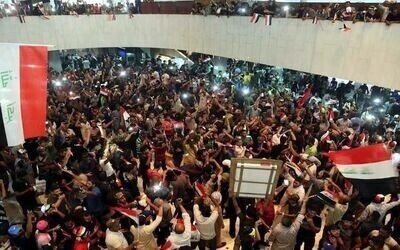Followers of Muqtada al-Sadr stormed Iraq’s parliament in Baghdad to protest the nomination of Mohammed Shia’ al-Sudani for the post of Prime Minister. |
Protesters stormed Iraq’s parliament this week. It’s not the first time protesters have entered the Green Zone in Baghdad where the parliament is located, but the images coming out of Wednesday evening’s event have been jarring.
The protesters back Muqtada al-Sadr and are angry that the pro-Iran parties in Iraq have backed Mohammed Shia al-Sudani as a candidate for prime minister. Nouri al-Maliki, head of the pro-Iran State of Law Party, was shown walking around with an AK-47 and an M-16 during the night’s disturbances.
Part of a cycle
The protests in Iraq are part of a cycle. Iraq has no government and the country is teetering on the brink of chaos. In northern Iraq, Turkish forces have been shelling civilians and killing a number of tourists recently. However, Baghdad can’t assert its authority to get Ankara to withdraw its forces because it is in disorder. Turkey claims to be “fighting terrorists” in Iraq, but the killing of tourists raises questions about whether it feels increased impunity to attack Iraq.
Meanwhile, there have been a number of rocket attacks. Rockets were fired on Tuesday from west of Kirkuk near a town called Qara Hanjir targeting the Khor Mor gas field, operated by the UAE’s Dana Gas. That attack, which is in the autonomous Kurdistan region, appears to be from pro-Iran militias using what appear to be 122mm rockets. A Kia truck with simple rocket launchers attached to the back was found on Wednesday night.
Other rockets targeted the Turkish consulate in Mosul this week. That attack appears to be a response to Ankara’s killing of the tourists. Iraq has complained to the UN about the Turkish attacks. The rocket attack may have been carried out by pro-Iran militias acting alone or with anti-Turkish groups that operate in the Nineveh plains. Turkey’s nearby base at Bashiqa has been targeted numerous times in similar rocket attacks from those plains over the last year.
The rocket attacks and the protests in Baghdad, coupled with Turkey’s continued operations in Iraq, all erode the country’s stability.
Will ISIS exploit lack of stability in Baghdad?
It is unclear if extremist groups like ISIS will exploit this.
What is clear is that pro-Iran militias, former Iraqi leaders like Nouri al-Maliki and Turkey will all exploit the weakness of Iraq to settle scores.
This comes as the Kurdistan region, which is more wealthy and stable than the rest of Iraq, is still trying to negotiate with Baghdad over oil revenues and energy disputes.
But Turkey‘s ongoing operations – and Iran’s recent claims to have arrested members of the Komala Kurdish group – point to the fact that the Kurdistan region is very much in the cross hairs of regional powers.
Seth Frantzman is a Ginsburg-Milstein Writing Fellow at the Middle East Forum and senior Middle East correspondent at The Jerusalem Post.







